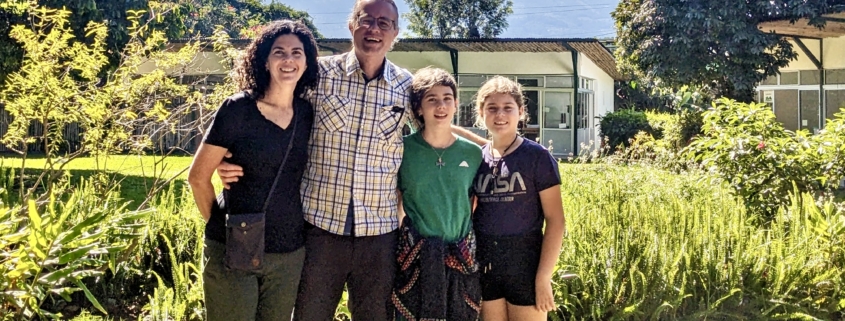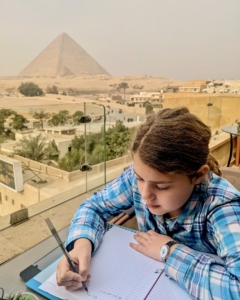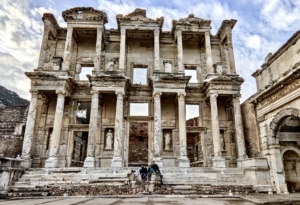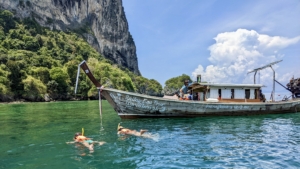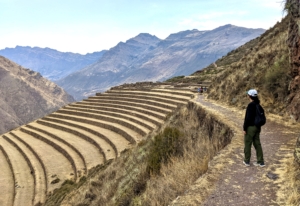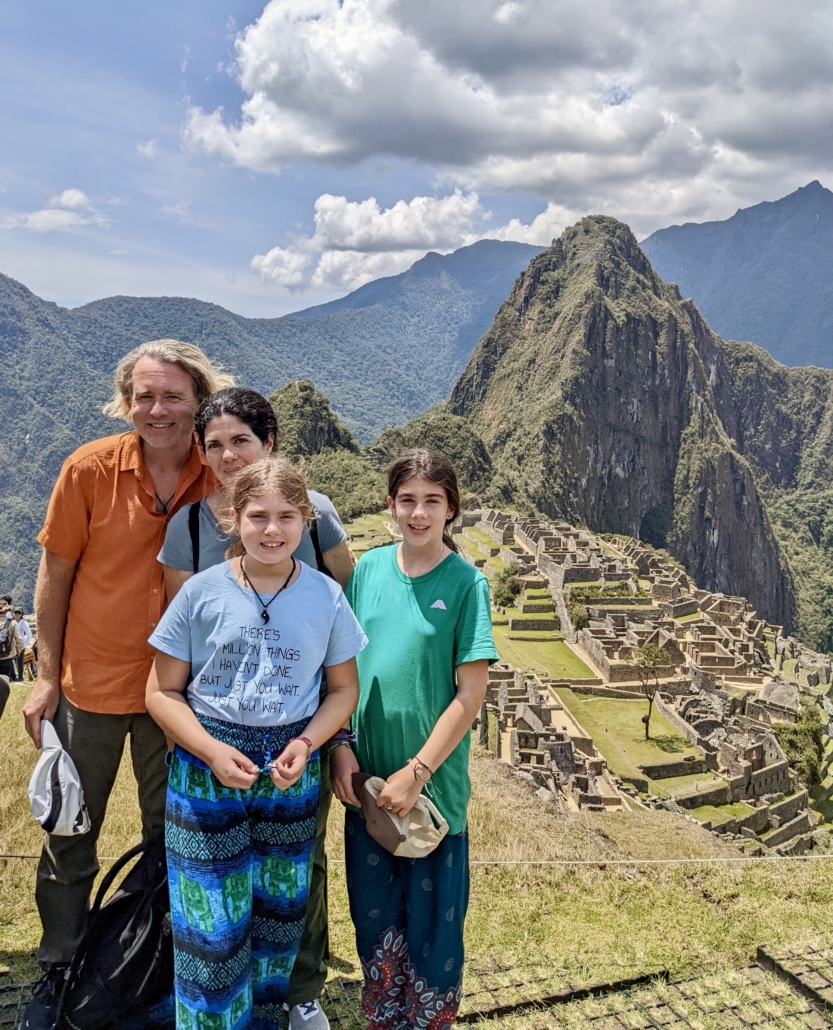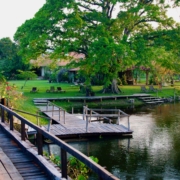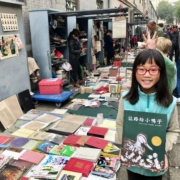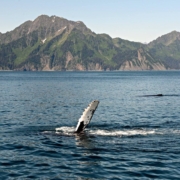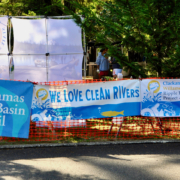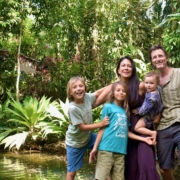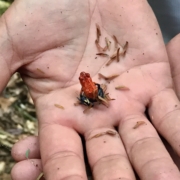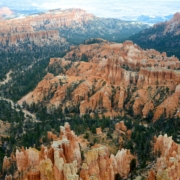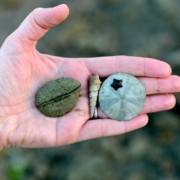Fernweh Families: The Zelenka/Tolks
We are excited to continue our interview series highlighting worldschooling families, offered to help inspire current and future travelers and foster a sense of community. We call the series “Fernweh Families.”
Fernweh is a German word coming from fern (“far”) and weh (“pain”) – literally, “far pain,” most often translated to English as “a desire to travel,” or, more simply, “wanderlust.”
Our second traveling family is the Tolk Family – Stephanie and her husband Scott are in the second year of world travel with their daughters Mira and Penelope, ages twelve and thirteen. In her own words, Stephanie shares with us her insights of both inward and outward journeys.
We are a family of four originally from Portland, Oregon. Prior to leaving the country, we had a fairly traditional lifestyle, with both my husband and I working nearly full time while our children attended public school. Because my husband and I had experienced the joys and personal growth associated with international travel, we’d known for many years that we would take our children abroad.
Please tell us a bit about your journey (trip duration or how travel fits into your lives, “big picture” view of your route, slow vs. fast travel, any trip themes or shared travel goals).
After a pandemic-related postponement, we left the US in September 2021 and have taken two school years out of the country with a visit home for a few months in between. During the first year, we traveled quickly, visiting 13 countries on three continents, and during the second year, we chose slower travel, prioritizing learning Spanish in three countries in Latin America. As we plan to return to the US in the summer of 2023, we’re organizing a hybrid that includes part of the year in Oregon and part of the year abroad.
What was one of the most important ingredients in getting your family on the road – what did you do that worked out well?
My husband and I knew for a long time that we would travel with our daughters, and we always envisioned the journey beginning in middle school when the girls would be old enough to independently engage with our surroundings but young enough to value family time. We spent a lot of time talking with the girls about our trip, bringing up pieces in conversation over many years so that they never felt the idea was sprung upon them. Where appropriate, we engaged them in research, asked them about their dreams and wishes, helped them envision what a typical day might be like, and more, to build buy-in and excitement.
What’s outside your window right now? What fascinates you about where you are?
I’m writing from Merida, Mexico in Yucatan State, a few blocks from the oldest cathedral in Mexico, built just after the arrival of the Spanish. While we’re here for just a short time as we move between cities, I’m fascinated by the way in which Yucatecos embrace and celebrate their cultural heritage. On two consecutive nights we’ve attended cultural events: one night, we watched traditional dancing in the Parque Santa Lucia, and on the following night, we saw a multimedia display on the cathedral cataloging the history of the city and state in a vibrant exhibition.
What have you discovered about your family by being on the road together?
My children had been in public school for many years prior to our first year of worldschooling, and on average, we spent six waking hours together each day. When we pulled the children from school, we doubled that number, and when we left the US, my husband and I began working remotely. With all of these additional hours together, we began to understand one another more, to notice our patterns, what drove us mad, and who needed breaks when. We tapped into one another’s rhythms in ways we hadn’t been able to do while living a busy American life, developing empathy for one another’s needs and deeper connections.
What does community mean to you, and how have you found it during your travels?
I believe there are two types of community for worldschoolers–other traveling families and local people living in traditional, non-touristy spots abroad—and both are important to access and know. Sometimes, worldschoolers gravitate toward other travelers from the US, Canada, or Europe, visiting worldschooling hubs, expat communities, or towns that are popular with digital nomads. These communities offer camaraderie, comfort, and like-mindedness. But as we’ve all chosen to travel to transcend our comfort zones, immersion into local communities is also vital for expanding our perspectives and building respect and understanding of other ways of life. We’ve found the latter through Workaway experiences, overland travel, stays in less popular destinations, and simply by wandering markets or public squares.
What do you wish a fellow worldschooling family had told you before you left home?
I wish someone had told me not to be too attached to my assumptions before I left home. Worldschooling is a process of evolution. Perhaps at first you think that five nights in a hotel is a long stay, but months later, you’re booking for a minimum of two weeks. Maybe you envision keeping pace with school at home through online courses or workbooks, but months later, you’ve opened to a completely different way to learn. As we travel, we become inspired by the places we see and the people we meet, and we become influenced to evolve and change.
Metaphorically speaking, what is something you’ve lost and something you’ve found during your journey?
When I was 22-years-old, I moved to Mali, West Africa for two years, and while I’d thought I had a global worldview from previous travels, it expanded enormously in Mali. I spent another 25 years using that worldview in daily life, perhaps understanding the impact of foreign policy differently or seeing social issues in an expanded light. What I didn’t expect from worldschooling in my 40s is that my worldview could expand even more, matching the current chapter of life. As a middle-aged woman, an entrepreneur, a mother, and an educational guide for my children, I’ve gained another layer to my global perspective, borrowing ideas from the world around me to be a better businessperson, teacher, and mother.
What’s your favorite story to share about this experience?
One of my family’s favorite worldschooling experiences took place in rural, eastern Czech Republic, on the opposite side of the country from Prague and quite close to the Slovakia border. We had arranged a Workaway with a Czech host family, our “work” being simple: we were just to speak English. On one lovely fall day, we joined the family—parents and three sons—to the country home they shared with the adult siblings and their families. The cousins amounted to 13 children in all.
Within walking distance of Castle Hukvaldy, constructed in the 13th century, we spent the day wandering the castle grounds and surrounding park and enjoying meals and games back at the family home. In the evening, the Czechs sang traditional songs by a fire while the children played on a swing, and most of us spent the night in a jumble of thick blankets on the floor. Later that year, we would venture inside the Great Pyramid at Giza, snorkel with sea turtles, hike in the mountains of northern Vietnam, tour Machu Picchu and much, much more, but those moments of connection and play in rural Czech Republic reminded us that relationships matter more than just about everything else.
From Annika on the Wonder Year team:
Stephanie is an interviewee for our upcoming book Wonder Year. I’ve appreciated the depth of our conversations about power and privilege, ethics and true volunteering as a family. Another Returned Peace Corps Volunteer, we talked about authentic ways to make travel a true exchange rather than an act of consumption. I deeply admire Stephanie’s intentional mindset in parenting, education and travel as well as her entrepreneurial spirit.
Stephanie has a fantastic Udemy course on Worldschooling here. She also is a contributor to an anthology of essays by worldschooling families called Worldschooling: Innovative Parents Turing Countries into Classrooms. Also, you can check out her website, Deliberated Detours www.deliberatedetour.com, for fabulous resource offerings including private coaching. To read more of her writing, go to stephanietolk.medium.com.
You can follow her on social media:
Facebook Deliberate Detour
Instagram @deliberatedetour
Personal Page @traveling_zolks
To read about more inspiring families, click here to meet the Pages.
